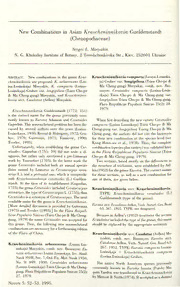
New combinations in Asian Krascheninnikovia Gueldenstaedt (Chenopodiaceae) PDF
Preview New combinations in Asian Krascheninnikovia Gueldenstaedt (Chenopodiaceae)
New Combinations in Asian Krascheninnikovia Gueldenstaedt (Chenopodiaceae) Sergei L. Mosyakin N. G. Kholodny Institute of Botany, 2 Tereshchenkivska Str., Kiev, 252601 Ukraine ABSTRACT. New combinations in the genus Kras¬ Krascheninnikovia compacta (Losina-Losinska¬ cheninnikovia are proposed: K. arborescens (Los- ja) Grubov var. longipilosa (Tsien Cho-po & ina-Losinskaja) Mosyakin, K. compacta (Losina- Ma Cheng-gung) Mosyakin, comb. nov. Bas¬ Losinskaja) Grubov var. longipilosa (Tsien Cho-po ionym: Ceratoides compacta (Losina-Losin¬ & Ma Cheng-gung) Mosyakin, and Krascheninni¬ skaja) Tsien Cho-po & Ma Cheng-gung var. kovia sect. Caudalae (Aellen) Mosyakin. longipilosa Tsien Cho-po & Ma Cheng-gung, Flora Reipublicae Popularis Sinicae 25(2): 28. 1979. Krascheninnikovia Gueldenstaedt (1772: 551) is the correct name for the genus previously com¬ monly known as Eurotia Adanson and Ceratoides When first describing the new variety Ceratoides Gagnebin. This nomenclatural problem has been dis¬ compacta (Losina-Losinskaja) Tsien Cho-po & Ma cussed by several authors over the years (Lozina- Cheng-gung var. longipilosa Tsieng Cho-po & Ma Lozinskaya, 1930; Reveal & Holmgren, 1972; Gru¬ Cheng-gung, the authors did not cite the basionym bov, 1976; Guterman, 1975; Tomsovic, 1990; for their new combination at the species level (see Tsvelev, 1993). Kung Hsien-wu et al., 1978). Thus, the complete Unfortunately, when establishing the genus Cer¬ combination (species plus variety) was validated later atoides, Gagnebin (1755: 59) did not write a di¬ in the Flora Reipublicae Popularis Sinicae (Tsien agnosis, but rather only mentioned a pre-Linnaean Cho-po & Ma Cheng-gung, 1979). work by Tournefort (1703). In the latter work the Two sections, based mostly on the differences in genus Ceratoides included both an annual species the structure of trichomes, were established by Ael¬ (later named by Linnaeus as Ceratocarpus aren- len (1952) for the genus Eurotia. The correct names arius L.), and a perennial one, which is conspecific for these sections, as well as a new combination for with Krascheninnikovia ceratoides (L.) Guelden¬ one of them, are given below. staedt. At the time of its establishment (Gagnebin, 1755) the genus Ceratoides included Ceratocarpus Krascheninnikovia sect. Krascheninnikovia. arenarius, the type of Ceratocarpus L. (1753); thus TYPE: Krascheninnikovia ceratoides (L.) Ceratoides is a synonym of Ceratocarpus. The next Gueldenstaedt (type of the genus). available name for the genus is Krascheninnikovia. [More detailed discussion is provided by Guterman Eurotia sect. Ecaudatae Aellen, Verh. Naturf. Ges. Basel (1975) and Tsvelev (1993).] In the Flora Reipub- 63: 267. 1952. TYPE: not designated. licae Popularis Sinicae (Tsien Cho-po & Ma Cheng- Because in Aellen’s (1952) treatment the section gung, 1979) the name Ceratoides was accepted for Ecaudatae included the type of the genus, this name this genus. Thus, the following new nomenclatural should be replaced by the appropriate autonym. combinations are necessary for a forthcoming edition of the Flora of China. Krascheninnikovia sect. Caudatae (Aellen) Mo¬ syakin, comb. nov. Basionym: Eurotia sect. Krascheninnikovia arborescens (Losina-Los- Caudalae Aellen, Verh. Naturf. Ges. Basel 63: inskaja) Mosyakin, comb. nov. Basionym: Eu¬ 267. 1952. TYPE: Eurotia compacta Losina- rotia arborescens Losina-Losinskaja, Izv. Akad. Losinskaja = Krascheninnikovia compacta Nauk SSSR, Ser. 7, Otd. Fiz.-Mat. Nauk 1930, (Losina-Losinskaja) Grubov. No. 9: 999. 1930. Ceratoides arborescens The native North American species previously (Losina-Losinskaja) Tsien Cho-po & Ma Cheng- commonly known as Eurotia lanala (Pursh) Mo- gung, Flora Reipublicae Popularis Sinicae 25(2): quin-Tandon was transferred to Krascheninnikovia 27. 1979. by Meeuse & Smith (1974). If accepted as a distinct Novon 5: 52-53. 1995. Volume 5, Number 1 Mosyakin 53 1995 Asian Krascheninnikovia entity, another North American taxon described by Ma Cheng-gung. 1978. The Chenopodiaceae in Chi¬ Rydberg (1912) as Eurotia subspinosa is in need na. Acta Phytotax. Sin. 16(1): 117. of the same transfer or a new infraspecific combi¬ Lozina-Lozinskaya (Losina-Losinskaja), A. S. 1930. Ma- terialy po izucheniyu roda Eurotia (Materials for the nation. However, in view of the current work on study of the genus Eurotia). Izv. Akad. Nauk SSSR, the Flora of North America project, I believe this Ser. 7, Otd. Fiz.-Mat. Nauk 1930, No. 9: 977- nomenclatural decision should be left to American 1007. botanists. Meeuse, A. D. J. & A. Smith. 1974. A new combination in Krascheninnikovia (Chenopod.). Taxon 20: 644. Reveal, J. L. & N. M. Holmgren. 1972. Ceratoides, Literature Cited an older generic name for Krascheninnikovia and Aellen, P. 1952. Ergebnisse einer botanisch-zoologisch- Eurotia. Taxon 21: 209. en Sammelreise durch den Iran. Botanische Ergeb¬ Rydberg, P. A. 1912. Studies of the Rocky Mt. Flora — nisse II. Chenopodiaceae: Agriophyllum, Esfandi- XXVII. Bull. Torrey Bot. Club 39: 310-328. aria, Eurotia. Verh. Naturf. Ges. Basel 63: 253- Tomsovic, P. 1990. Patri druh Ceratoides latens (Eu¬ 272. rotia ceratoides) do ceskoslovenske kveteny? (Does Gagnebin, A. 1755. Observations faites sur le systeme Ceratoides latens (Eurotia ceratoides) belong to the des autheurs de botanique et sur l’Ophris minima flora of Czechoslovakia?). Preslia (Praha) 62: 33- C.B. Acta Helv. Phys. Math. 2: 56-75. 39. Grubov, V. I. 1976. Proposal for conservation of the Tournefort, J. P. 1703 (repr. 1719). Corollarium in- genus name Eurotia Adans. against Axyris Linn. stitutionum rei herbariae. Lugdunii. Taxon 25: 362. Tsien Cho-po & Ma Cheng-gung. 1979. Ceratoides Gueldenstaedt, A. I. 1772. Krascheninnikovia, novum (Tourn.) Gagnebin. Pp. 24-28 in Flora Reipublicae plantarum genus. Novi. Comment. Acad. Sci. Imp. Popularis Sinicae. Vol. 25(2). Beijing. Petrop. 16: 548-560. Tsvelev, N. N. 1993. Zametki o marevykh (Cheno¬ Guterman, W. 1975. Notulae nomenclaturales. Phyton podiaceae) Vostochnoy Evropy (Notes on Chenopo¬ (Horn) 17 (1-2): 31-50. diaceae of Eastern Europe). Ukrayins’k. Bot. Zhurn. Kung Hsien-wu, Chu Ge-ling, Tsien Cho-po, Li An-jen & 50(1): 78-85.
